The Best 10 Alternatives to Sophos (+ Pricing & Reviews)
Twingate Team
•
Jul 27, 2024

Sophos provides comprehensive cybersecurity solutions, including endpoint security, network security, email security, and managed security services. While Sophos offers robust protection, it may not be the ideal choice for every organization. This article explores how Twingate enhances secure access for distributed workforces under a zero trust networking model.
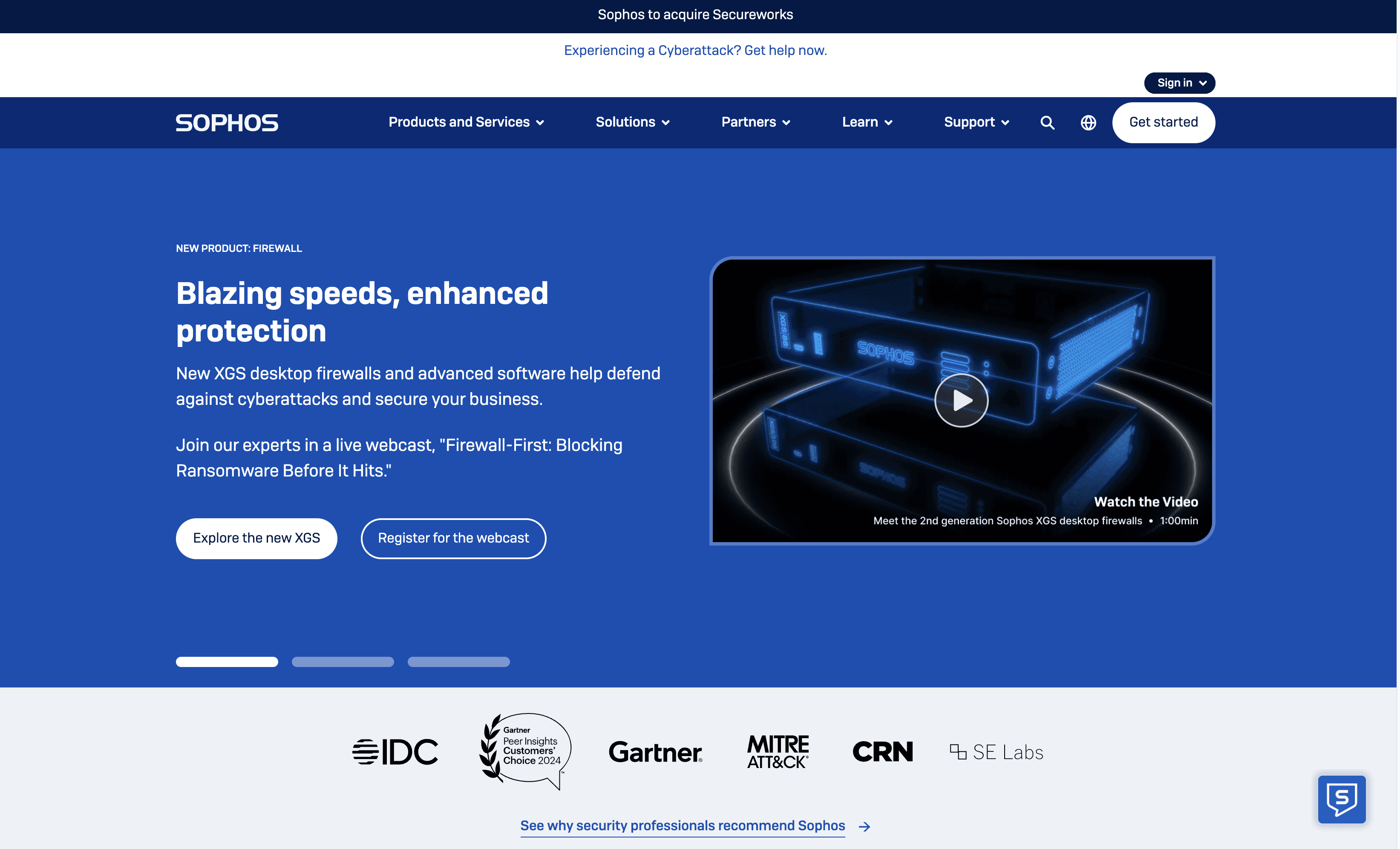
10 Alternatives to Sophos
1. Twingate
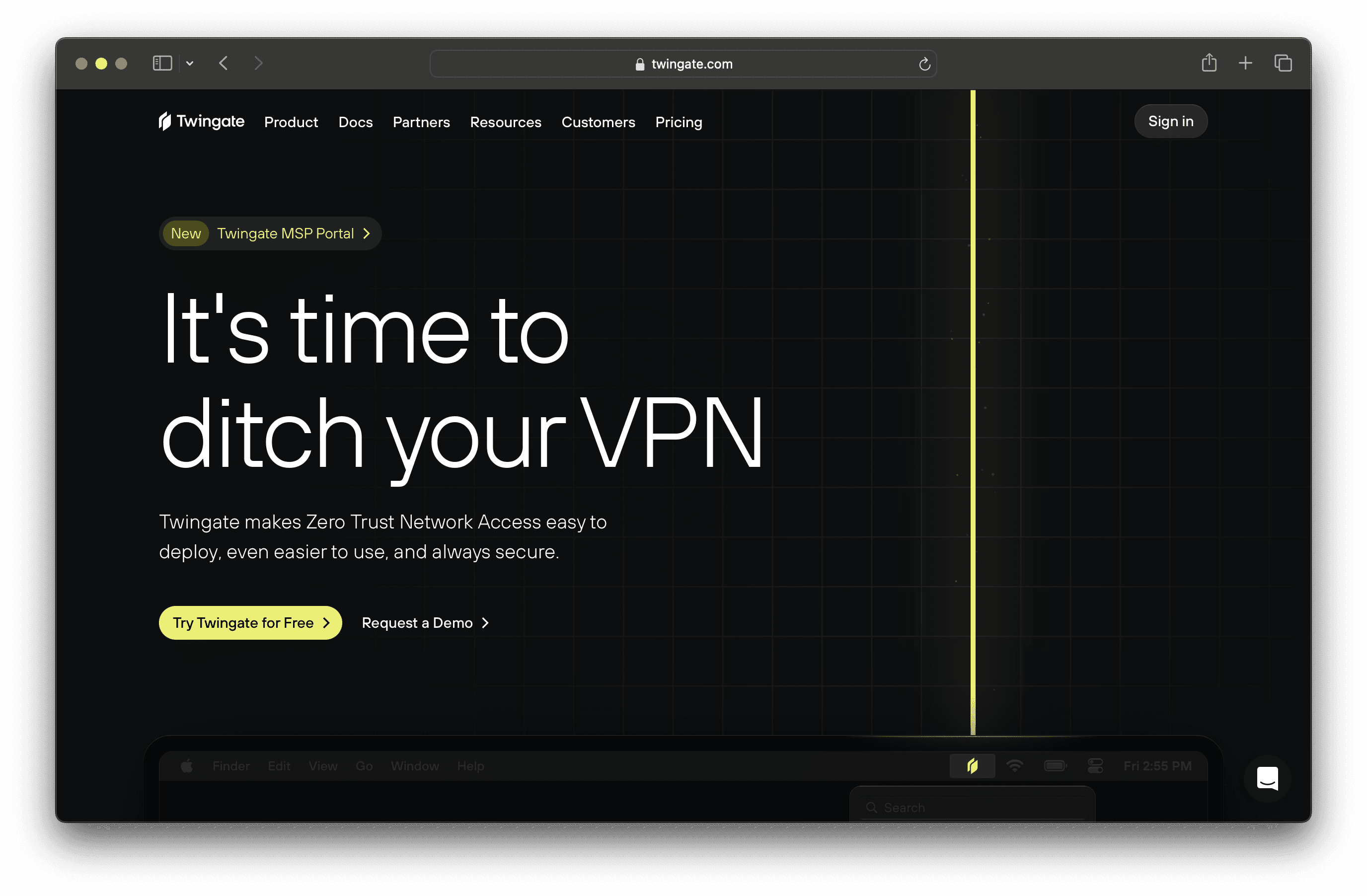
Twingate is a network security solution designed to replace traditional VPNs for remote access, offering a zero-trust security model and seamless deployment alongside existing infrastructure. With a focus on ease of use and scalability, Twingate aims to provide a secure and maintainable solution for businesses of all sizes.
Twingate Pricing
Starter: Free per user/month
Teams: $6 per user/month (monthly), $5 per user/month (yearly)
Business: $12 per user/month (monthly), $10 per user/month (yearly)
Enterprise: Custom per user/month
Twingate Reviews
Twingate has an overall rating of 4.7 out of 5 stars based on 63 reviews. Users praise its ease of setup and high security. Check out more of our reviews here!
Pros and Cons of Twingate
Pros:
Seamless integration with existing infrastructure, making it easy to deploy without disrupting current systems.
High security through a zero-trust model, ensuring that only authenticated users can access sensitive resources.
Excellent customer support, frequently praised for being responsive and helpful in resolving issues.
Cons:
Some users report performance issues, particularly when handling large volumes of data.
Limited customization options, which may not meet the specific needs of all organizations.
Logging issues have been noted, making it difficult to track and audit user activities effectively.
2. WebTitan Web Security
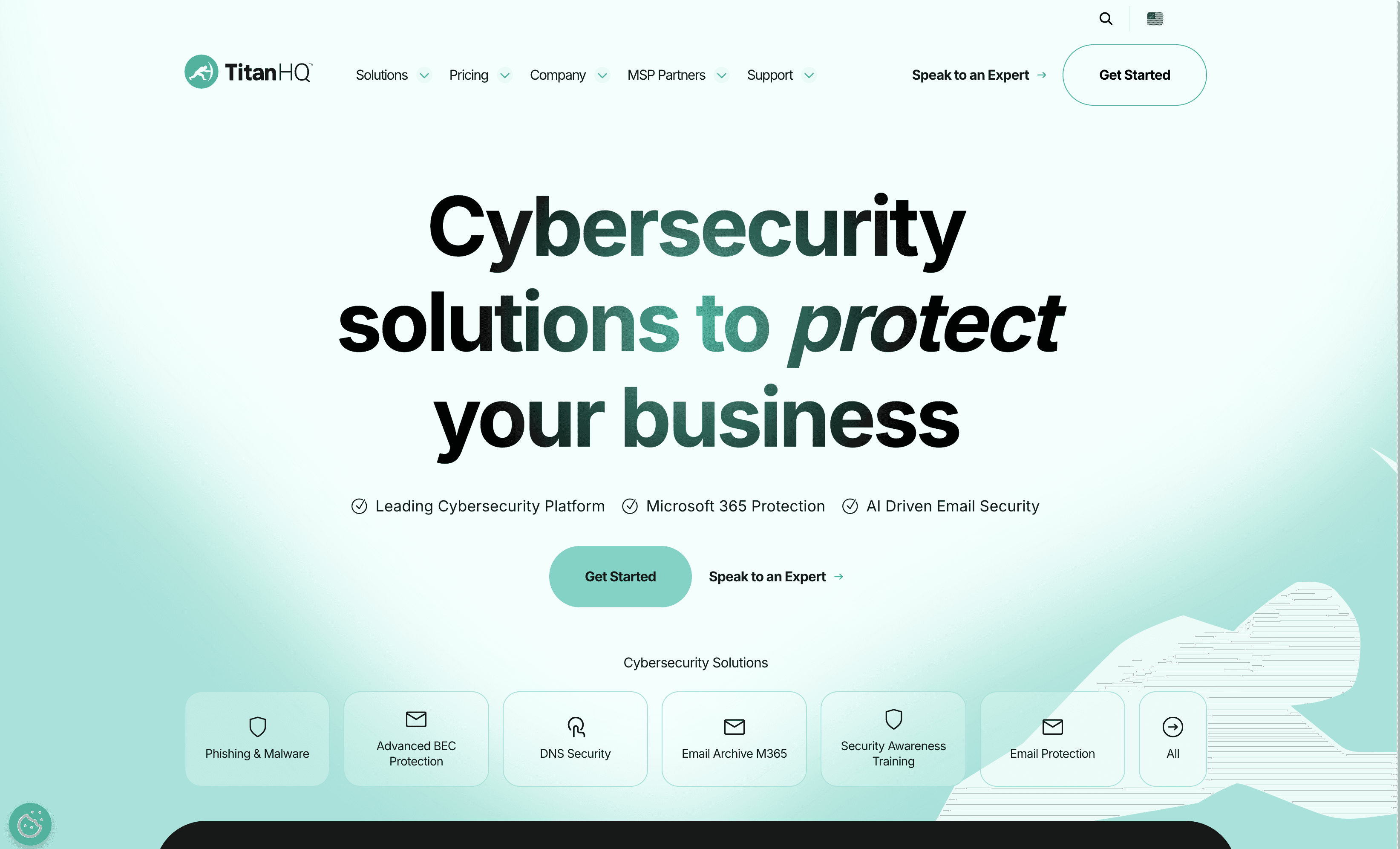
WebTitan is a web security solution designed to protect businesses from online threats, offering DNS filtering and malware protection. With a focus on ease of use and scalability, WebTitan aims to provide a secure and maintainable solution for organizations of all sizes.
WebTitan Web Security Pricing
WebTitan Web Security's pricing is not public. Contact their support for more info.
WebTitan Web Security Reviews
WebTitan Web Security has an overall rating of 4.3 out of 5 stars based on 85 reviews. Users appreciate its ease of setup and effective DNS protection. Check out more of our reviews here!
Pros and Cons ofWebTitan Web Security
Pros:
Comprehensive protection against malware, ransomware, and phishing sites, ensuring robust security for your organization.
Cloud-based deployment eliminates the need for hardware installation, offering seamless on-the-go protection.
Real-time threat detection using AI and machine learning for immediate response to online threats.
Cons:
False positives can block legitimate websites, causing potential disruptions in workflow.
Storage issues may arise if the appliance is not restarted periodically, affecting system performance.
Limited device support, particularly for smartphones and Linux devices, restricting comprehensive protection.
3. Azure DNS
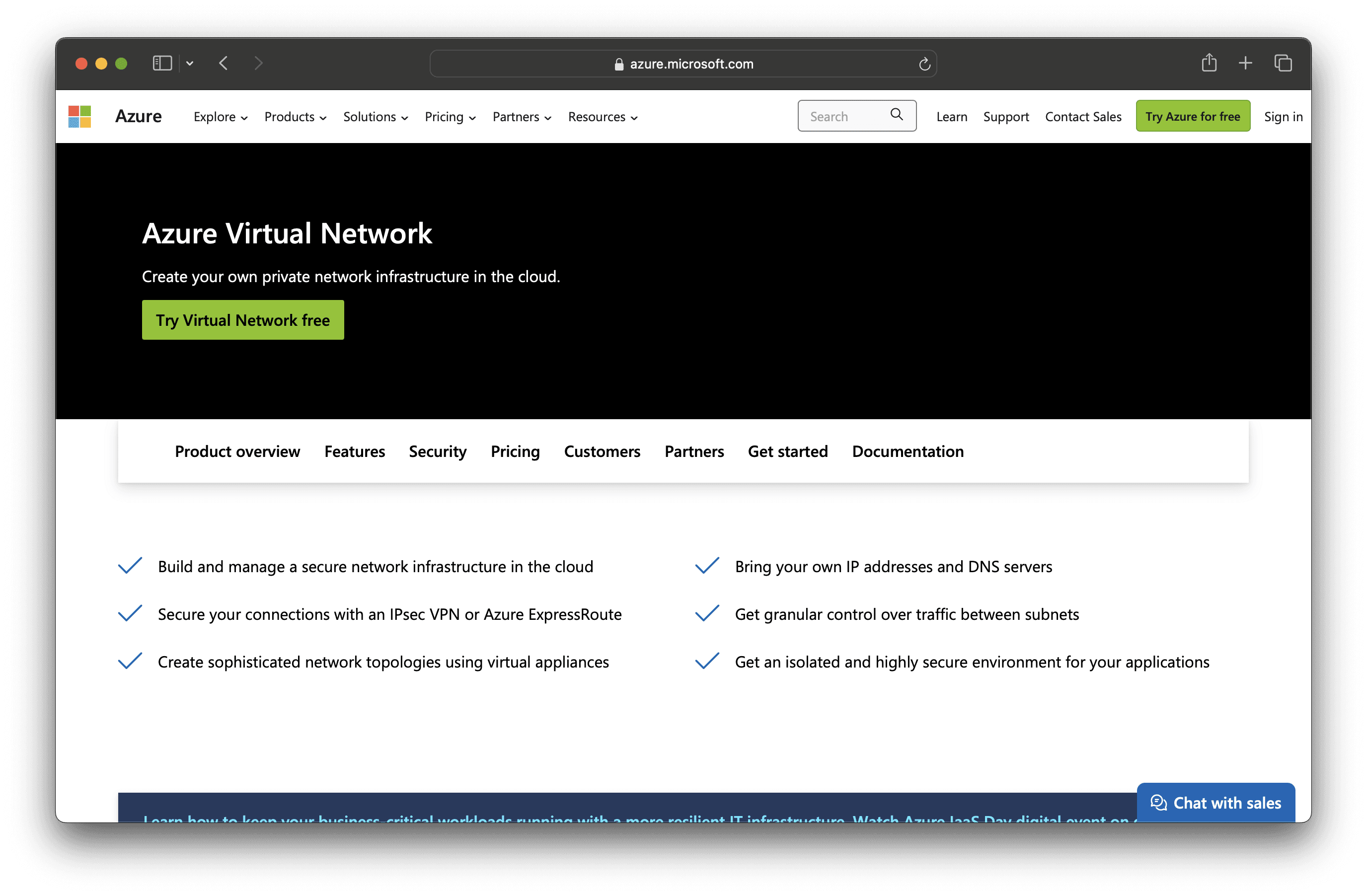
Azure DNS is a service that allows users to host their DNS domains in Azure, providing seamless integration with other Azure services, high availability, and fast DNS query responses. Designed for ease of use and scalability, Azure DNS aims to offer a reliable and efficient solution for managing DNS records.
Azure DNS Pricing
Azure DNS's pricing is not public. Contact their support for more info.
Azure DNS Reviews
Azure DNS has an overall rating of 4.4 out of 5 stars based on 23 reviews. Users appreciate its reliability and integration with other Azure services. Check out more of our reviews here!
Pros and Cons of Azure DNS
Pros:
High availability: Azure DNS leverages Microsoft's global network for ultra-high availability, ensuring your domains are always accessible.
Fast DNS queries: The global network of name servers and Anycast networking provide rapid DNS query responses.
Seamless integration: Manage DNS records using the same credentials, billing, and support contracts as other Azure services.
Cons:
Complex user interface: Some users find the interface challenging to navigate, which can hinder efficient management.
Cost considerations: While the pay-as-you-go model is flexible, costs can accumulate quickly based on usage.
Dependency on Azure: Full benefits and features are best leveraged within the Azure ecosystem, limiting flexibility for non-Azure users.
4. Avast Secure Web Gateway
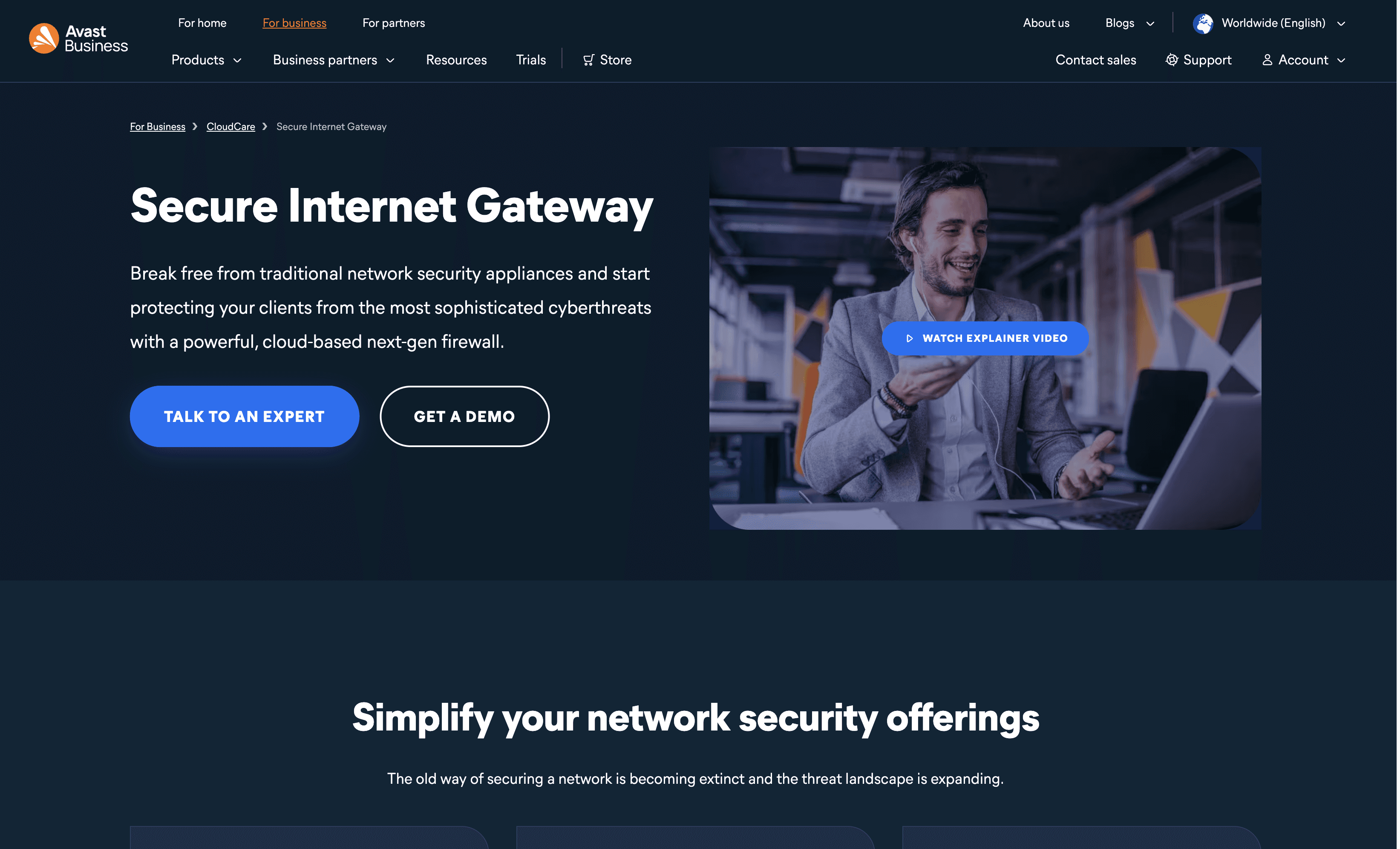
Avast Secure Web Gateway is a cloud-based network security solution designed to protect businesses from online threats. It offers features like full SSL/TLS inspection, URL filtering, and cloud sandboxing. With easy deployment and integration capabilities, Avast aims to provide robust security for organizations of all sizes.
Avast Secure Web Gateway Pricing
Avast Secure Web Gateway's pricing is not public. Contact their support for more info.
Avast Secure Web Gateway Reviews
Avast Secure Web Gateway has an overall rating of 5.0 out of 5 stars based on 2 reviews. Users praise its comprehensive protection and ease of use. Check out more of our reviews here!
Pros and Cons of Avast Secure Web Gateway
Pros:
Comprehensive SSL/TLS inspection ensures encrypted traffic is thoroughly examined, mitigating security risks.
Cloud-based solution reduces the need for costly hardware, simplifying management and lowering expenses.
Real-time URL scanning provides peace of mind by blocking phishing and malware threats instantly.
Cons:
False positives can occasionally block legitimate websites, causing workflow disruptions.
Performance issues may arise, with some users experiencing slowdowns after threat detection.
Dependency on cloud infrastructure may be less effective in areas with poor internet connectivity.
5. Gcore DNS
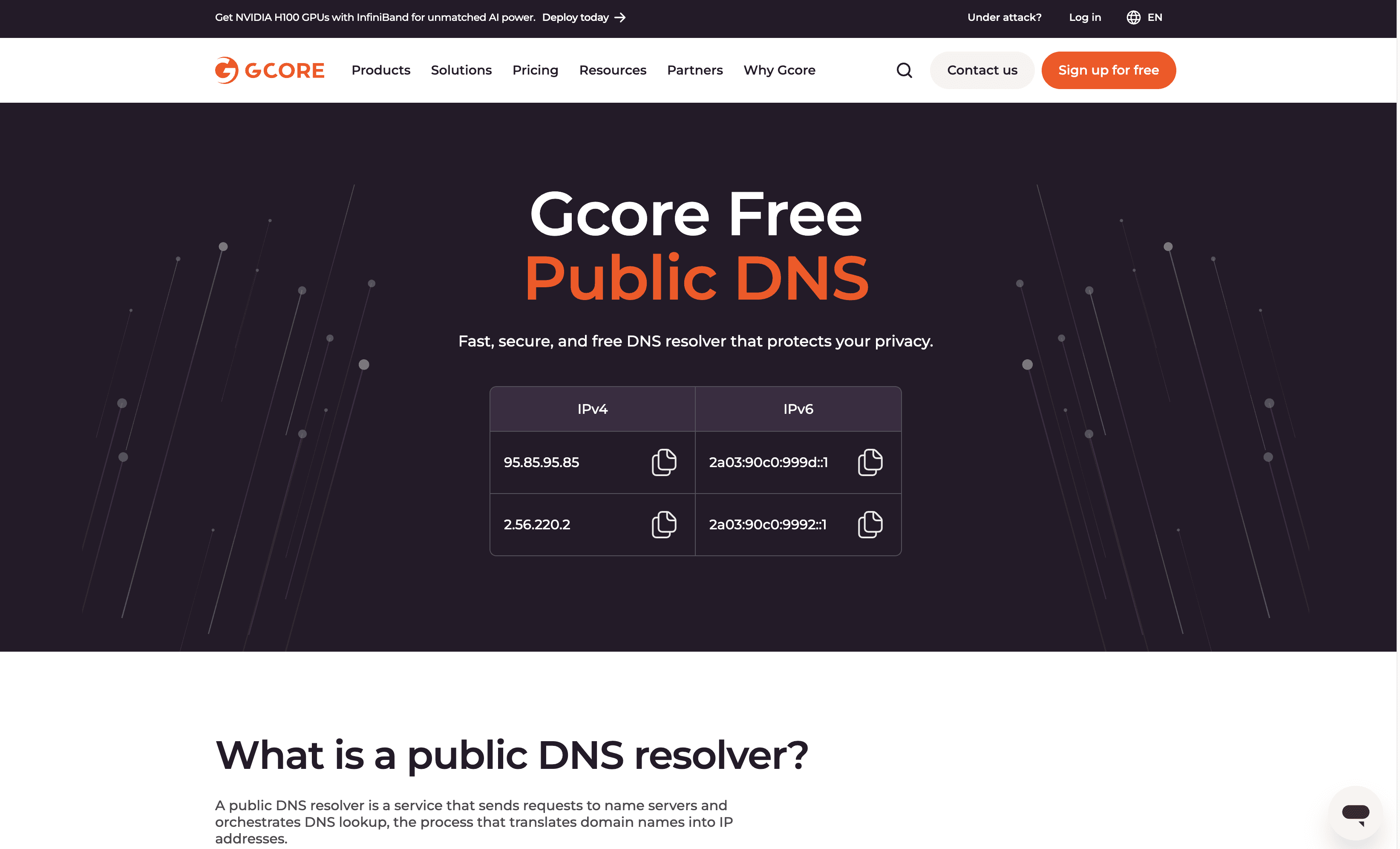
Gcore DNS is a robust DNS service designed to enhance web performance and security. It offers fast DNS resolution, privacy protection, and resilience against DDoS attacks. With easy setup and global reach, Gcore DNS aims to provide a reliable and efficient solution for users seeking improved internet experience.
Gcore DNS Pricing
Gcore DNS's pricing is not public. Contact their support for more info.
Gcore DNS Reviews
Gcore DNS has an overall rating of 4.3 out of 5 stars based on 13 reviews. Users praise its fast loading times and effective DNS management. Check out more of our reviews here!
Pros and Cons of Gcore DNS
Pros:
Speed: Gcore DNS is one of the fastest in Europe, South America, and Africa, ensuring quick DNS resolution.
Privacy: Anonymizes DNS query logs and stores them securely in a Luxembourg Tier IV data center.
DDoS Resilience: Utilizes an Anycast network with 180+ nodes worldwide, providing robust protection against DDoS attacks.
Cons:
Query Speed: While fast, Gcore's DNS resolver is not the fastest compared to some competitors.
Limited Advanced Features: The service lacks detailed information on advanced configurations for technical users.
Cost: Some users find the service expensive, especially for additional features.
6. PowerDNS
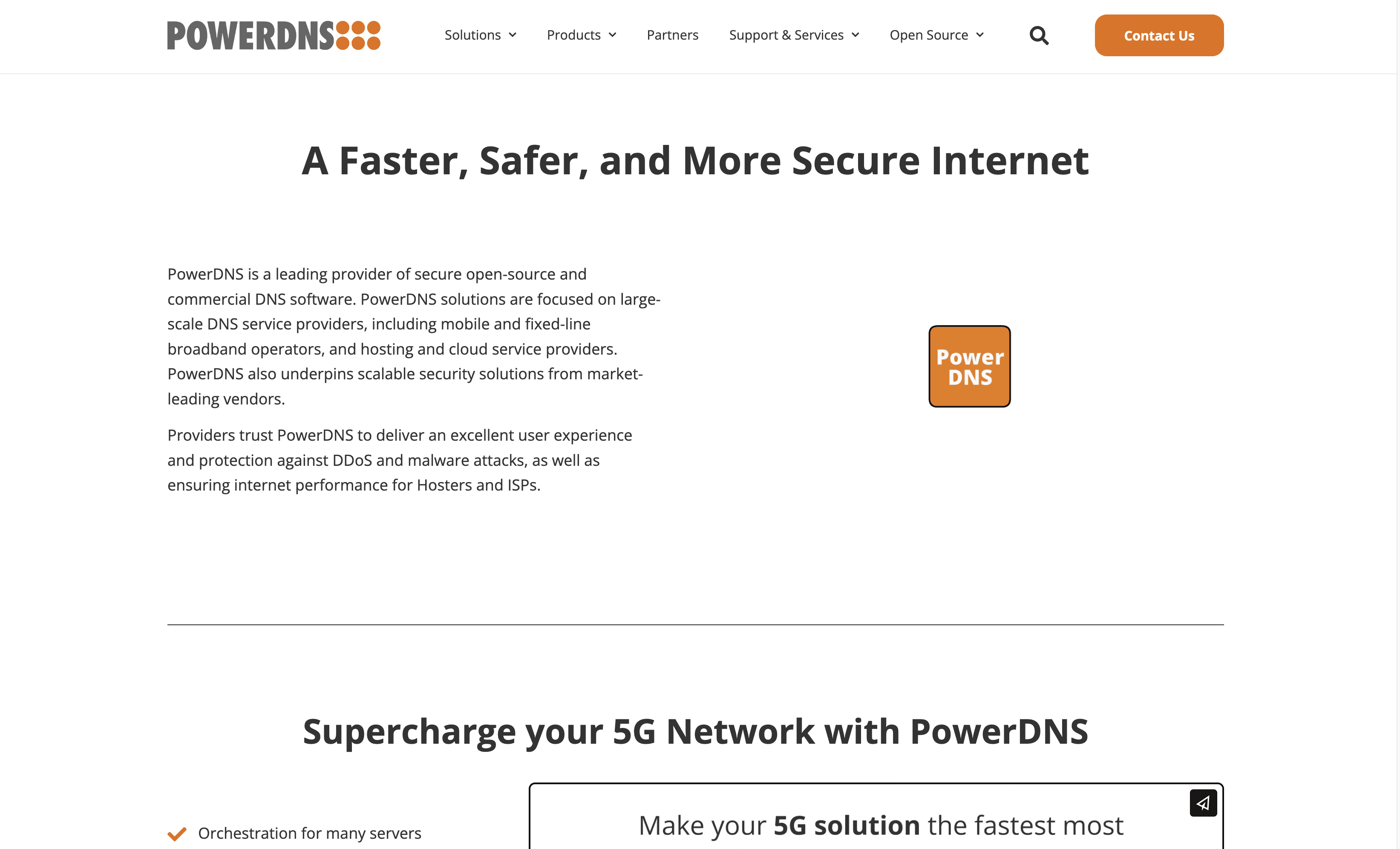
PowerDNS is a DNS software solution offering both open-source and commercial options. Designed for various operators, it provides secure, scalable, and high-performance DNS services. With features like DDoS protection and encrypted DNS, PowerDNS aims to enhance internet security and reliability for businesses of all sizes.
PowerDNS Pricing
PowerDNS's pricing is not public. Contact their support for more info.
PowerDNS Reviews
PowerDNS has an overall rating of 4.7 out of 5 stars based on 13 reviews. Users appreciate its flexibility and ease of management. Check out more of our reviews here!
Pros and Cons of PowerDNS
Pros:
PowerDNS offers robust security features, including protection against DDoS and malware attacks, ensuring a secure DNS environment.
Its high performance guarantees excellent internet speed and reliability, making it ideal for hosters and ISPs.
Scalability is a key strength, with solutions designed to support large-scale DNS service providers efficiently.
Cons:
The lack of an integrated management interface can make it challenging for users to manage DNS settings efficiently.
Some users report issues with duplicate records, which can complicate DNS management.
The REST API is considered difficult to understand, posing a learning curve for new users.
7. Loopia DNS
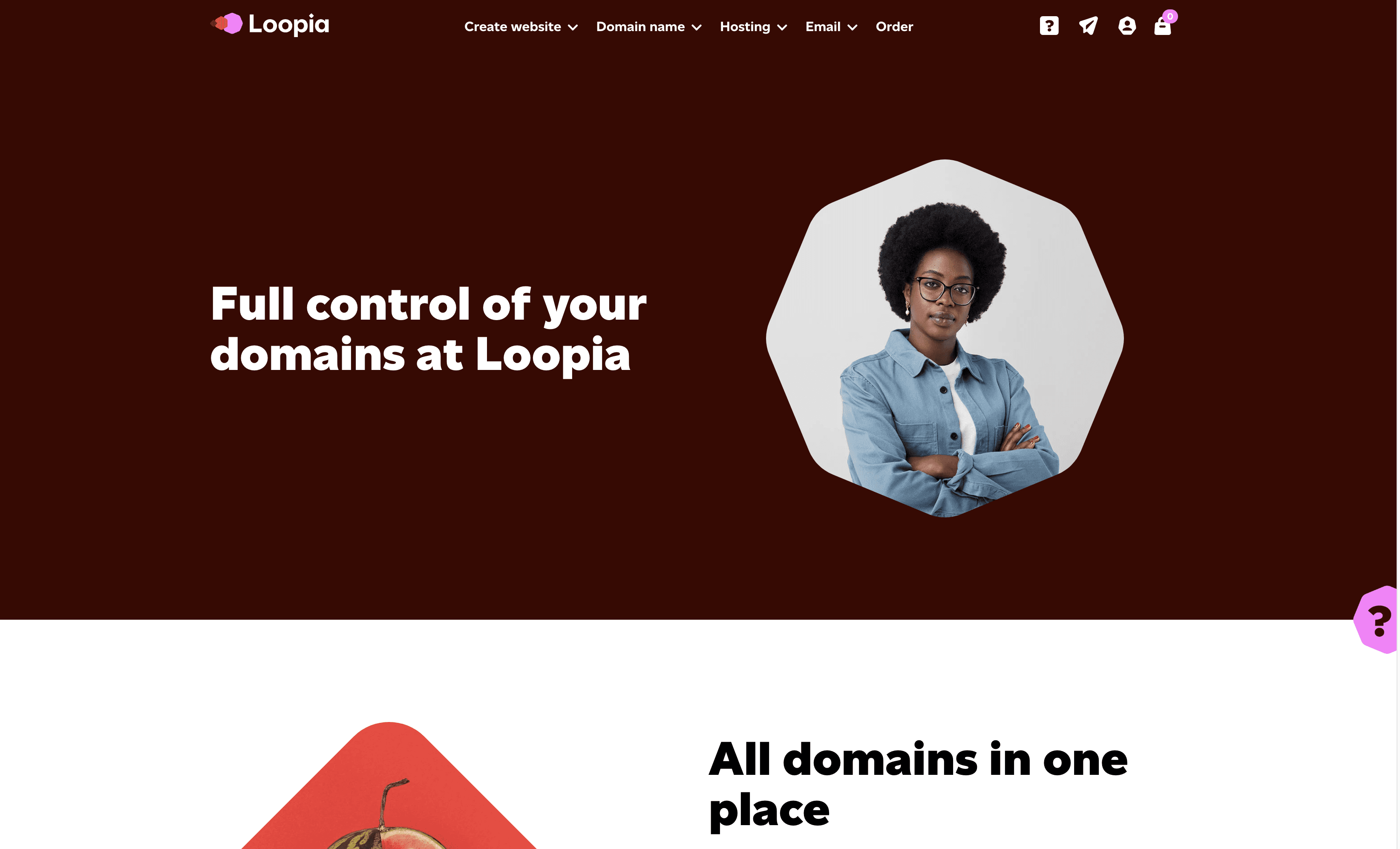
LoopiaDNS is a service designed to manage and administer domain names efficiently. It offers features like dynamic DNS updates, email forwarding, and advanced DNS configurations. With a user-friendly control panel, LoopiaDNS aims to simplify domain management for businesses and individuals alike.
Loopia DNS Pricing
LoopiaDomain: 0 SEK
LoopiaDNS: 9 SEK/month excluding VAT, 11.25 SEK/month including VAT
Loopia DNS Reviews
Loopia DNS has an overall rating of 4.1 out of 5 stars based on 12 reviews. Users appreciate its ease of use and efficient domain management. Check out more of our reviews here!
Pros and Cons of Loopia DNS
Pros:
Unlimited Domains: Manage an unlimited number of domain names and subdomains effortlessly.
Dynamic DNS: Update DNS settings dynamically, ideal for domains with changing IP addresses.
Advanced Configuration: Set up CNAME, A, and MX records with ease, offering comprehensive DNS management.
Cons:
Cost: Monthly fee of 9 SEK excluding VAT, which may add up for some users.
Technical Support: Resolution of issues can be time-consuming, affecting user experience.
Server Downtime: Servers may experience downtime at the start of the month due to billing loads.
8. SafeDNS
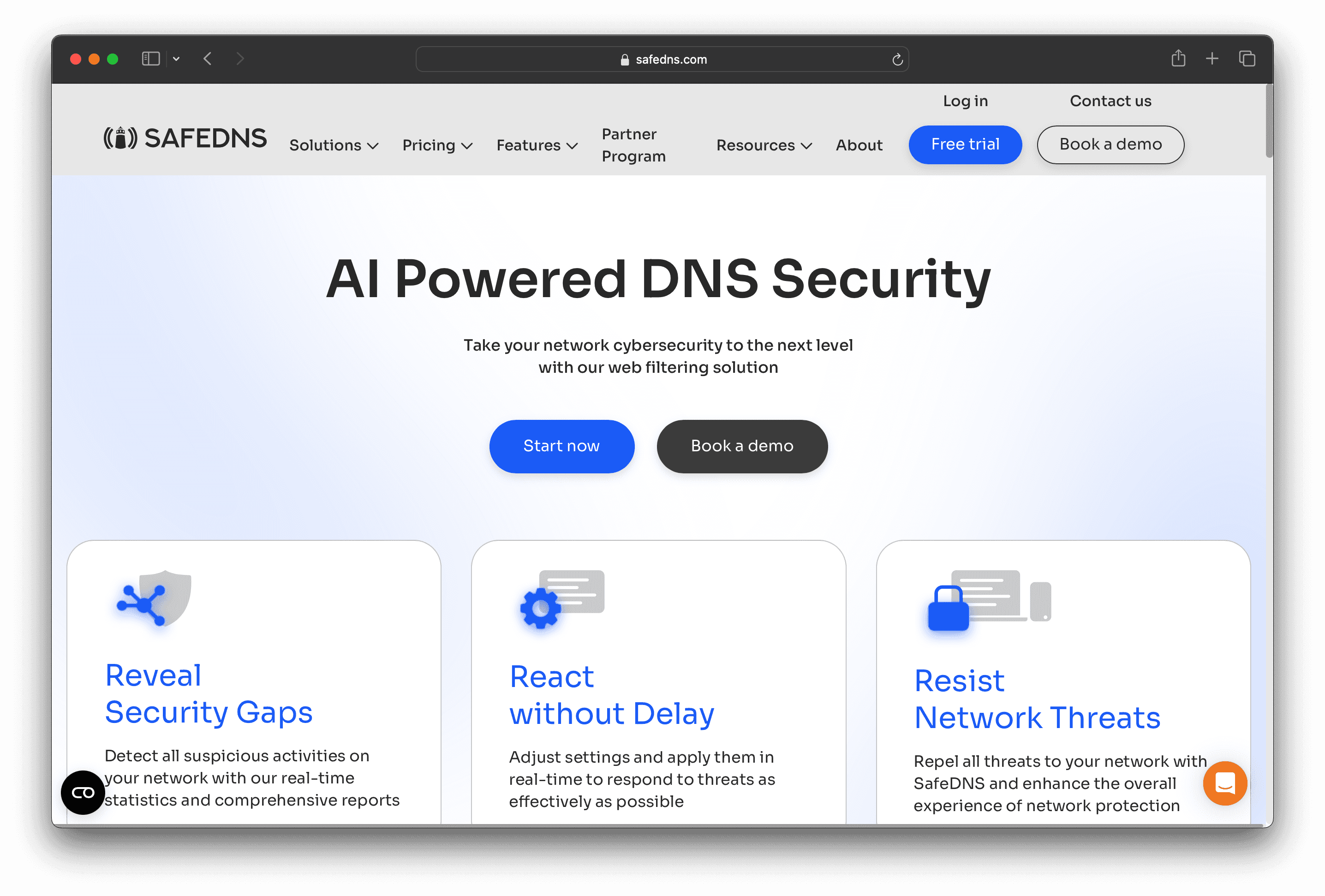
SafeDNS is a cloud-based DNS filtering solution designed to enhance network cybersecurity through AI-powered web filtering. It offers quick setup, robust protection against phishing and malware, and detailed reporting. SafeDNS aims to provide an easy-to-use and effective security solution for businesses and individuals alike.
SafeDNS Pricing
Safe Home: $25.95 per year, $39.95 per 2 years
Safe Family: $35.95 per year, $55.95 per 2 years
SafeDNS Reviews
SafeDNS has an overall rating of 4.7 out of 5 stars based on 15 reviews. Users find it simple and effective. Check out more of our reviews here!
Pros and Cons of SafeDNS
Pros:
Effective Content Filtering: Filters inappropriate content across 66 categories using AI and machine learning.
Instant Filtering Deployment: Easy and quick setup with zero cost implementation and free tech support.
Phishing & Malware Protection: Advanced detection to block threats before they reach the device.
Cons:
Whitelist Management: Some users find managing whitelists to be a bit hard.
Interface Speed: The interface can sometimes be slow.
Lack of iOS Agent: There is no iOS agent available, which some users wish for.
9. CloudFloorDNS
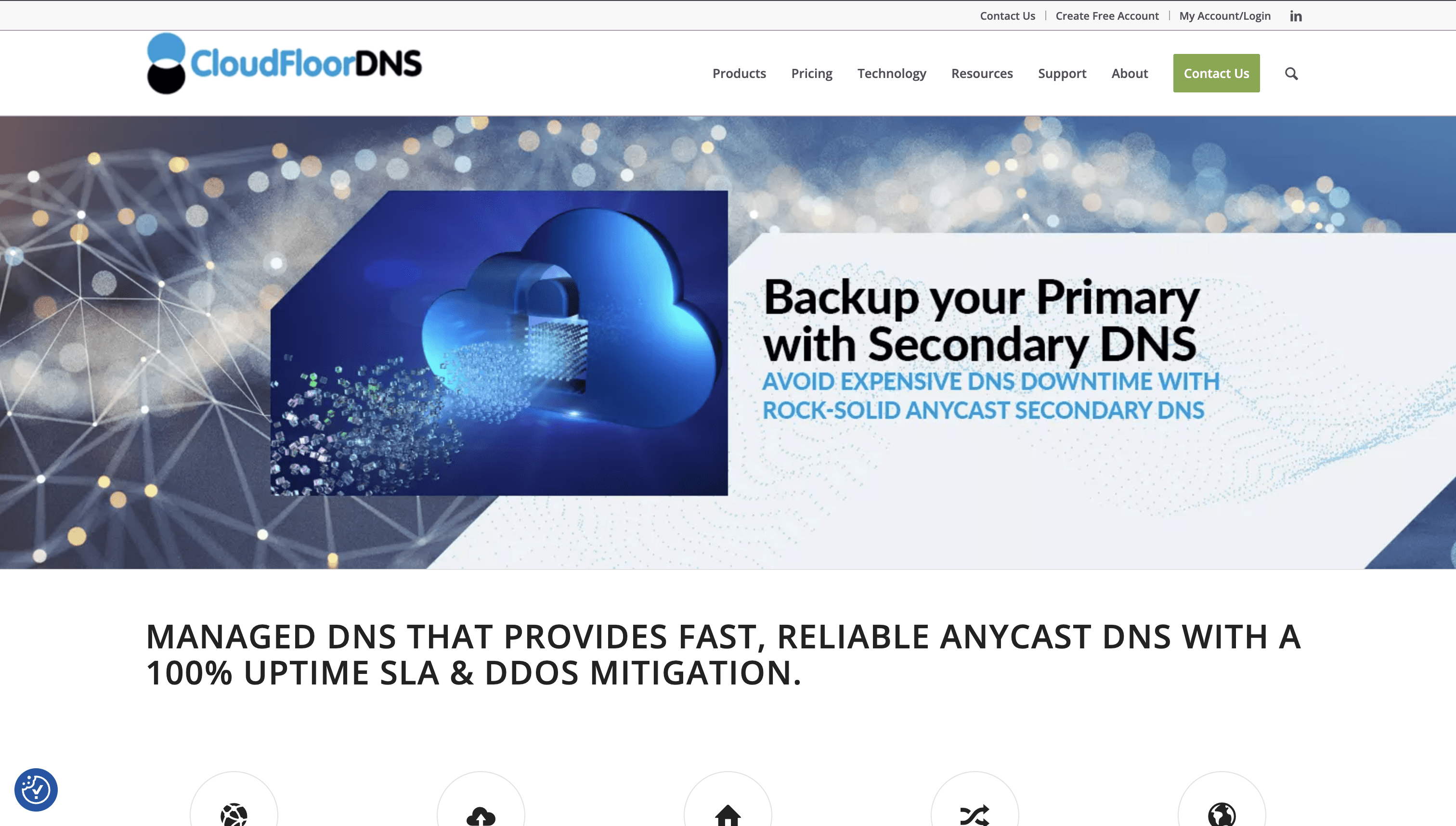
CloudfloorDNS is a DNS management service offering features like Managed DNS, DNS Failover, and GEO DNS. It focuses on reliability, speed, and security with a 100% uptime SLA and DDoS mitigation. Designed for ease of use, CloudfloorDNS aims to provide robust DNS solutions for businesses of all sizes.
CloudFloorDNS Pricing
Anycast DNS Plans & Pricing
Advanced DNS & Domains Pricing
Secure SSL Certificates
Buy Webzones
CloudFloorDNS's pricing is not public. Contact their support for more info.
CloudFloorDNS Reviews
CloudFloorDNS has an overall rating of 4.4 out of 5 stars based on 13 reviews. Users praise its security and flexibility. Check out more of our reviews here!
Pros and Cons of CloudFloorDNS
Pros:
100% Uptime SLA: CloudFloorDNS guarantees 100% DNS uptime, ensuring your services are always accessible.
Global Anycast Network: With 15+ points of presence across four continents, it offers fast and reliable DNS resolution.
DDoS Mitigation: Robust protection against DDoS attacks, enhancing the security of your DNS infrastructure.
Cons:
Cost: The service is relatively expensive compared to competitors, which may be a concern for budget-conscious users.
Integration Process: Some users find the integration process slow and cumbersome, affecting initial setup efficiency.
Annual Pricing: Lack of a monthly payment option can be a drawback for users preferring more flexible billing cycles.
10. ESET Parental Control
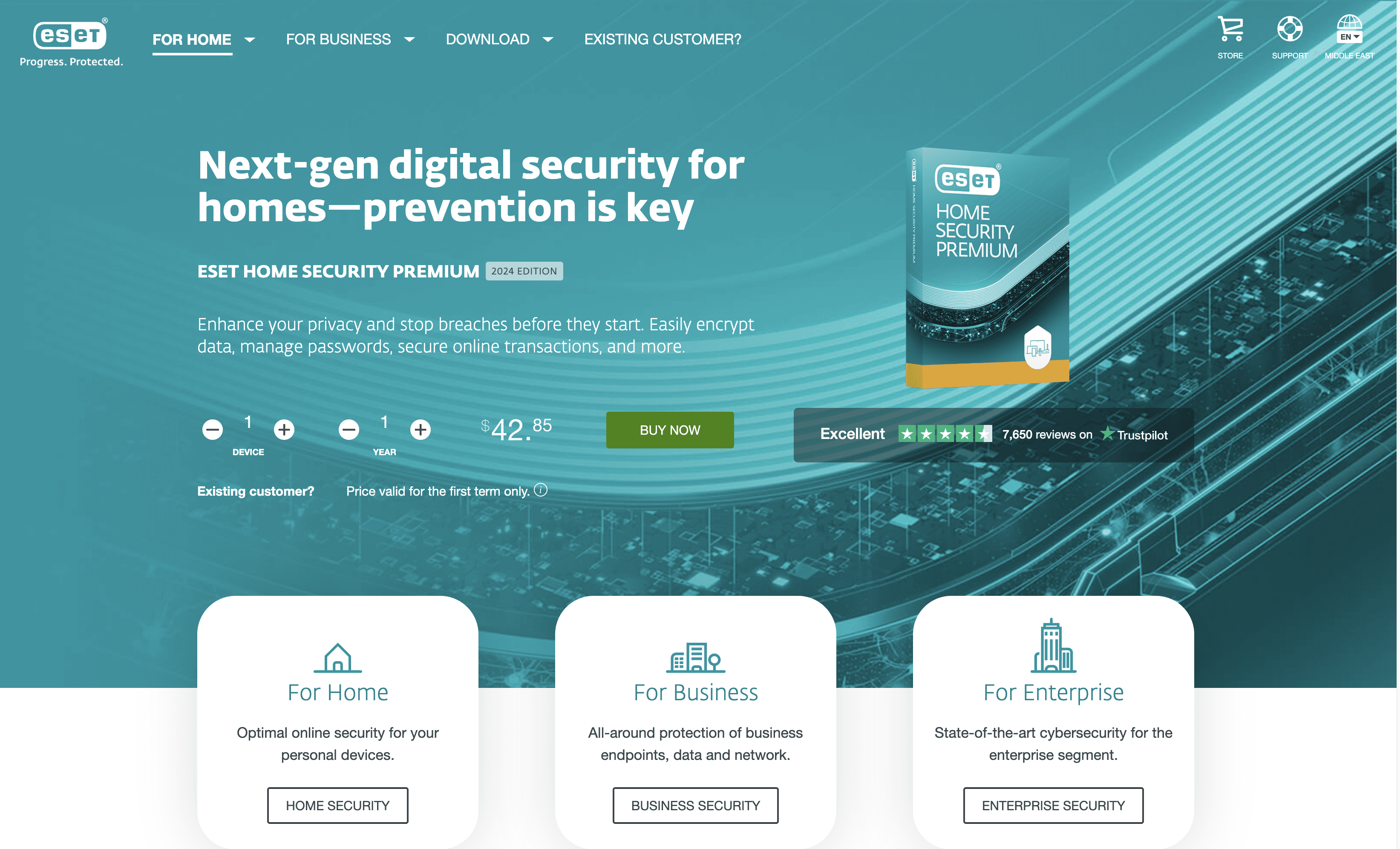
ESET Parental Control is a security solution designed to help parents manage and monitor their children's online activities. It offers features like app blocking, web filtering, and location tracking. With a focus on ease of use and comprehensive protection, ESET Parental Control aims to provide a safe online environment for kids.
ESET Parental Control Pricing
Essential: $29.95 per year for one device
Premium: $44.95 per year for three devices
Ultimate: $89.95 per year for five devices
ESET Parental Control Reviews
ESET Parental Control has an overall rating of 4.3 out of 5 stars based on 10 reviews. Users find it easy to understand and manage. Check out more of our reviews here!
Pros and Cons of ESET Parental Control
Pros:
Reliable Protection: ESET Parental Control offers robust security, ensuring children are safe from online threats.
Minimal Impact on Device Performance: Operates smoothly without slowing down devices, maintaining optimal performance.
Ease of Use: User-friendly interface with automated processes, making it simple for parents to manage.
Cons:
Price Validity: Initial pricing is attractive, but renewal costs can be significantly higher.
Limited Information on Specific Features: The website lacks detailed descriptions of the Parental Control features.
Learning Curve: Some users may find it challenging to navigate and utilize all features effectively.
Looking to secure your technical infrastructure?
Twingate offers granular access controls and deployment automations to protect your VPC environment. By leveraging Zero Trust security tools, Twingate ensures that private resources and internet traffic remain secure in the modern world of work. Try Twingate for Free today!
Rapidly implement a modern Zero Trust network that is more secure and maintainable than VPNs.
The Best 10 Alternatives to Sophos (+ Pricing & Reviews)
Twingate Team
•
Jul 27, 2024

Sophos provides comprehensive cybersecurity solutions, including endpoint security, network security, email security, and managed security services. While Sophos offers robust protection, it may not be the ideal choice for every organization. This article explores how Twingate enhances secure access for distributed workforces under a zero trust networking model.

10 Alternatives to Sophos
1. Twingate

Twingate is a network security solution designed to replace traditional VPNs for remote access, offering a zero-trust security model and seamless deployment alongside existing infrastructure. With a focus on ease of use and scalability, Twingate aims to provide a secure and maintainable solution for businesses of all sizes.
Twingate Pricing
Starter: Free per user/month
Teams: $6 per user/month (monthly), $5 per user/month (yearly)
Business: $12 per user/month (monthly), $10 per user/month (yearly)
Enterprise: Custom per user/month
Twingate Reviews
Twingate has an overall rating of 4.7 out of 5 stars based on 63 reviews. Users praise its ease of setup and high security. Check out more of our reviews here!
Pros and Cons of Twingate
Pros:
Seamless integration with existing infrastructure, making it easy to deploy without disrupting current systems.
High security through a zero-trust model, ensuring that only authenticated users can access sensitive resources.
Excellent customer support, frequently praised for being responsive and helpful in resolving issues.
Cons:
Some users report performance issues, particularly when handling large volumes of data.
Limited customization options, which may not meet the specific needs of all organizations.
Logging issues have been noted, making it difficult to track and audit user activities effectively.
2. WebTitan Web Security

WebTitan is a web security solution designed to protect businesses from online threats, offering DNS filtering and malware protection. With a focus on ease of use and scalability, WebTitan aims to provide a secure and maintainable solution for organizations of all sizes.
WebTitan Web Security Pricing
WebTitan Web Security's pricing is not public. Contact their support for more info.
WebTitan Web Security Reviews
WebTitan Web Security has an overall rating of 4.3 out of 5 stars based on 85 reviews. Users appreciate its ease of setup and effective DNS protection. Check out more of our reviews here!
Pros and Cons ofWebTitan Web Security
Pros:
Comprehensive protection against malware, ransomware, and phishing sites, ensuring robust security for your organization.
Cloud-based deployment eliminates the need for hardware installation, offering seamless on-the-go protection.
Real-time threat detection using AI and machine learning for immediate response to online threats.
Cons:
False positives can block legitimate websites, causing potential disruptions in workflow.
Storage issues may arise if the appliance is not restarted periodically, affecting system performance.
Limited device support, particularly for smartphones and Linux devices, restricting comprehensive protection.
3. Azure DNS

Azure DNS is a service that allows users to host their DNS domains in Azure, providing seamless integration with other Azure services, high availability, and fast DNS query responses. Designed for ease of use and scalability, Azure DNS aims to offer a reliable and efficient solution for managing DNS records.
Azure DNS Pricing
Azure DNS's pricing is not public. Contact their support for more info.
Azure DNS Reviews
Azure DNS has an overall rating of 4.4 out of 5 stars based on 23 reviews. Users appreciate its reliability and integration with other Azure services. Check out more of our reviews here!
Pros and Cons of Azure DNS
Pros:
High availability: Azure DNS leverages Microsoft's global network for ultra-high availability, ensuring your domains are always accessible.
Fast DNS queries: The global network of name servers and Anycast networking provide rapid DNS query responses.
Seamless integration: Manage DNS records using the same credentials, billing, and support contracts as other Azure services.
Cons:
Complex user interface: Some users find the interface challenging to navigate, which can hinder efficient management.
Cost considerations: While the pay-as-you-go model is flexible, costs can accumulate quickly based on usage.
Dependency on Azure: Full benefits and features are best leveraged within the Azure ecosystem, limiting flexibility for non-Azure users.
4. Avast Secure Web Gateway

Avast Secure Web Gateway is a cloud-based network security solution designed to protect businesses from online threats. It offers features like full SSL/TLS inspection, URL filtering, and cloud sandboxing. With easy deployment and integration capabilities, Avast aims to provide robust security for organizations of all sizes.
Avast Secure Web Gateway Pricing
Avast Secure Web Gateway's pricing is not public. Contact their support for more info.
Avast Secure Web Gateway Reviews
Avast Secure Web Gateway has an overall rating of 5.0 out of 5 stars based on 2 reviews. Users praise its comprehensive protection and ease of use. Check out more of our reviews here!
Pros and Cons of Avast Secure Web Gateway
Pros:
Comprehensive SSL/TLS inspection ensures encrypted traffic is thoroughly examined, mitigating security risks.
Cloud-based solution reduces the need for costly hardware, simplifying management and lowering expenses.
Real-time URL scanning provides peace of mind by blocking phishing and malware threats instantly.
Cons:
False positives can occasionally block legitimate websites, causing workflow disruptions.
Performance issues may arise, with some users experiencing slowdowns after threat detection.
Dependency on cloud infrastructure may be less effective in areas with poor internet connectivity.
5. Gcore DNS

Gcore DNS is a robust DNS service designed to enhance web performance and security. It offers fast DNS resolution, privacy protection, and resilience against DDoS attacks. With easy setup and global reach, Gcore DNS aims to provide a reliable and efficient solution for users seeking improved internet experience.
Gcore DNS Pricing
Gcore DNS's pricing is not public. Contact their support for more info.
Gcore DNS Reviews
Gcore DNS has an overall rating of 4.3 out of 5 stars based on 13 reviews. Users praise its fast loading times and effective DNS management. Check out more of our reviews here!
Pros and Cons of Gcore DNS
Pros:
Speed: Gcore DNS is one of the fastest in Europe, South America, and Africa, ensuring quick DNS resolution.
Privacy: Anonymizes DNS query logs and stores them securely in a Luxembourg Tier IV data center.
DDoS Resilience: Utilizes an Anycast network with 180+ nodes worldwide, providing robust protection against DDoS attacks.
Cons:
Query Speed: While fast, Gcore's DNS resolver is not the fastest compared to some competitors.
Limited Advanced Features: The service lacks detailed information on advanced configurations for technical users.
Cost: Some users find the service expensive, especially for additional features.
6. PowerDNS

PowerDNS is a DNS software solution offering both open-source and commercial options. Designed for various operators, it provides secure, scalable, and high-performance DNS services. With features like DDoS protection and encrypted DNS, PowerDNS aims to enhance internet security and reliability for businesses of all sizes.
PowerDNS Pricing
PowerDNS's pricing is not public. Contact their support for more info.
PowerDNS Reviews
PowerDNS has an overall rating of 4.7 out of 5 stars based on 13 reviews. Users appreciate its flexibility and ease of management. Check out more of our reviews here!
Pros and Cons of PowerDNS
Pros:
PowerDNS offers robust security features, including protection against DDoS and malware attacks, ensuring a secure DNS environment.
Its high performance guarantees excellent internet speed and reliability, making it ideal for hosters and ISPs.
Scalability is a key strength, with solutions designed to support large-scale DNS service providers efficiently.
Cons:
The lack of an integrated management interface can make it challenging for users to manage DNS settings efficiently.
Some users report issues with duplicate records, which can complicate DNS management.
The REST API is considered difficult to understand, posing a learning curve for new users.
7. Loopia DNS

LoopiaDNS is a service designed to manage and administer domain names efficiently. It offers features like dynamic DNS updates, email forwarding, and advanced DNS configurations. With a user-friendly control panel, LoopiaDNS aims to simplify domain management for businesses and individuals alike.
Loopia DNS Pricing
LoopiaDomain: 0 SEK
LoopiaDNS: 9 SEK/month excluding VAT, 11.25 SEK/month including VAT
Loopia DNS Reviews
Loopia DNS has an overall rating of 4.1 out of 5 stars based on 12 reviews. Users appreciate its ease of use and efficient domain management. Check out more of our reviews here!
Pros and Cons of Loopia DNS
Pros:
Unlimited Domains: Manage an unlimited number of domain names and subdomains effortlessly.
Dynamic DNS: Update DNS settings dynamically, ideal for domains with changing IP addresses.
Advanced Configuration: Set up CNAME, A, and MX records with ease, offering comprehensive DNS management.
Cons:
Cost: Monthly fee of 9 SEK excluding VAT, which may add up for some users.
Technical Support: Resolution of issues can be time-consuming, affecting user experience.
Server Downtime: Servers may experience downtime at the start of the month due to billing loads.
8. SafeDNS

SafeDNS is a cloud-based DNS filtering solution designed to enhance network cybersecurity through AI-powered web filtering. It offers quick setup, robust protection against phishing and malware, and detailed reporting. SafeDNS aims to provide an easy-to-use and effective security solution for businesses and individuals alike.
SafeDNS Pricing
Safe Home: $25.95 per year, $39.95 per 2 years
Safe Family: $35.95 per year, $55.95 per 2 years
SafeDNS Reviews
SafeDNS has an overall rating of 4.7 out of 5 stars based on 15 reviews. Users find it simple and effective. Check out more of our reviews here!
Pros and Cons of SafeDNS
Pros:
Effective Content Filtering: Filters inappropriate content across 66 categories using AI and machine learning.
Instant Filtering Deployment: Easy and quick setup with zero cost implementation and free tech support.
Phishing & Malware Protection: Advanced detection to block threats before they reach the device.
Cons:
Whitelist Management: Some users find managing whitelists to be a bit hard.
Interface Speed: The interface can sometimes be slow.
Lack of iOS Agent: There is no iOS agent available, which some users wish for.
9. CloudFloorDNS

CloudfloorDNS is a DNS management service offering features like Managed DNS, DNS Failover, and GEO DNS. It focuses on reliability, speed, and security with a 100% uptime SLA and DDoS mitigation. Designed for ease of use, CloudfloorDNS aims to provide robust DNS solutions for businesses of all sizes.
CloudFloorDNS Pricing
Anycast DNS Plans & Pricing
Advanced DNS & Domains Pricing
Secure SSL Certificates
Buy Webzones
CloudFloorDNS's pricing is not public. Contact their support for more info.
CloudFloorDNS Reviews
CloudFloorDNS has an overall rating of 4.4 out of 5 stars based on 13 reviews. Users praise its security and flexibility. Check out more of our reviews here!
Pros and Cons of CloudFloorDNS
Pros:
100% Uptime SLA: CloudFloorDNS guarantees 100% DNS uptime, ensuring your services are always accessible.
Global Anycast Network: With 15+ points of presence across four continents, it offers fast and reliable DNS resolution.
DDoS Mitigation: Robust protection against DDoS attacks, enhancing the security of your DNS infrastructure.
Cons:
Cost: The service is relatively expensive compared to competitors, which may be a concern for budget-conscious users.
Integration Process: Some users find the integration process slow and cumbersome, affecting initial setup efficiency.
Annual Pricing: Lack of a monthly payment option can be a drawback for users preferring more flexible billing cycles.
10. ESET Parental Control

ESET Parental Control is a security solution designed to help parents manage and monitor their children's online activities. It offers features like app blocking, web filtering, and location tracking. With a focus on ease of use and comprehensive protection, ESET Parental Control aims to provide a safe online environment for kids.
ESET Parental Control Pricing
Essential: $29.95 per year for one device
Premium: $44.95 per year for three devices
Ultimate: $89.95 per year for five devices
ESET Parental Control Reviews
ESET Parental Control has an overall rating of 4.3 out of 5 stars based on 10 reviews. Users find it easy to understand and manage. Check out more of our reviews here!
Pros and Cons of ESET Parental Control
Pros:
Reliable Protection: ESET Parental Control offers robust security, ensuring children are safe from online threats.
Minimal Impact on Device Performance: Operates smoothly without slowing down devices, maintaining optimal performance.
Ease of Use: User-friendly interface with automated processes, making it simple for parents to manage.
Cons:
Price Validity: Initial pricing is attractive, but renewal costs can be significantly higher.
Limited Information on Specific Features: The website lacks detailed descriptions of the Parental Control features.
Learning Curve: Some users may find it challenging to navigate and utilize all features effectively.
Looking to secure your technical infrastructure?
Twingate offers granular access controls and deployment automations to protect your VPC environment. By leveraging Zero Trust security tools, Twingate ensures that private resources and internet traffic remain secure in the modern world of work. Try Twingate for Free today!
Rapidly implement a modern Zero Trust network that is more secure and maintainable than VPNs.
The Best 10 Alternatives to Sophos (+ Pricing & Reviews)
Twingate Team
•
Jul 27, 2024

Sophos provides comprehensive cybersecurity solutions, including endpoint security, network security, email security, and managed security services. While Sophos offers robust protection, it may not be the ideal choice for every organization. This article explores how Twingate enhances secure access for distributed workforces under a zero trust networking model.

10 Alternatives to Sophos
1. Twingate

Twingate is a network security solution designed to replace traditional VPNs for remote access, offering a zero-trust security model and seamless deployment alongside existing infrastructure. With a focus on ease of use and scalability, Twingate aims to provide a secure and maintainable solution for businesses of all sizes.
Twingate Pricing
Starter: Free per user/month
Teams: $6 per user/month (monthly), $5 per user/month (yearly)
Business: $12 per user/month (monthly), $10 per user/month (yearly)
Enterprise: Custom per user/month
Twingate Reviews
Twingate has an overall rating of 4.7 out of 5 stars based on 63 reviews. Users praise its ease of setup and high security. Check out more of our reviews here!
Pros and Cons of Twingate
Pros:
Seamless integration with existing infrastructure, making it easy to deploy without disrupting current systems.
High security through a zero-trust model, ensuring that only authenticated users can access sensitive resources.
Excellent customer support, frequently praised for being responsive and helpful in resolving issues.
Cons:
Some users report performance issues, particularly when handling large volumes of data.
Limited customization options, which may not meet the specific needs of all organizations.
Logging issues have been noted, making it difficult to track and audit user activities effectively.
2. WebTitan Web Security

WebTitan is a web security solution designed to protect businesses from online threats, offering DNS filtering and malware protection. With a focus on ease of use and scalability, WebTitan aims to provide a secure and maintainable solution for organizations of all sizes.
WebTitan Web Security Pricing
WebTitan Web Security's pricing is not public. Contact their support for more info.
WebTitan Web Security Reviews
WebTitan Web Security has an overall rating of 4.3 out of 5 stars based on 85 reviews. Users appreciate its ease of setup and effective DNS protection. Check out more of our reviews here!
Pros and Cons ofWebTitan Web Security
Pros:
Comprehensive protection against malware, ransomware, and phishing sites, ensuring robust security for your organization.
Cloud-based deployment eliminates the need for hardware installation, offering seamless on-the-go protection.
Real-time threat detection using AI and machine learning for immediate response to online threats.
Cons:
False positives can block legitimate websites, causing potential disruptions in workflow.
Storage issues may arise if the appliance is not restarted periodically, affecting system performance.
Limited device support, particularly for smartphones and Linux devices, restricting comprehensive protection.
3. Azure DNS

Azure DNS is a service that allows users to host their DNS domains in Azure, providing seamless integration with other Azure services, high availability, and fast DNS query responses. Designed for ease of use and scalability, Azure DNS aims to offer a reliable and efficient solution for managing DNS records.
Azure DNS Pricing
Azure DNS's pricing is not public. Contact their support for more info.
Azure DNS Reviews
Azure DNS has an overall rating of 4.4 out of 5 stars based on 23 reviews. Users appreciate its reliability and integration with other Azure services. Check out more of our reviews here!
Pros and Cons of Azure DNS
Pros:
High availability: Azure DNS leverages Microsoft's global network for ultra-high availability, ensuring your domains are always accessible.
Fast DNS queries: The global network of name servers and Anycast networking provide rapid DNS query responses.
Seamless integration: Manage DNS records using the same credentials, billing, and support contracts as other Azure services.
Cons:
Complex user interface: Some users find the interface challenging to navigate, which can hinder efficient management.
Cost considerations: While the pay-as-you-go model is flexible, costs can accumulate quickly based on usage.
Dependency on Azure: Full benefits and features are best leveraged within the Azure ecosystem, limiting flexibility for non-Azure users.
4. Avast Secure Web Gateway

Avast Secure Web Gateway is a cloud-based network security solution designed to protect businesses from online threats. It offers features like full SSL/TLS inspection, URL filtering, and cloud sandboxing. With easy deployment and integration capabilities, Avast aims to provide robust security for organizations of all sizes.
Avast Secure Web Gateway Pricing
Avast Secure Web Gateway's pricing is not public. Contact their support for more info.
Avast Secure Web Gateway Reviews
Avast Secure Web Gateway has an overall rating of 5.0 out of 5 stars based on 2 reviews. Users praise its comprehensive protection and ease of use. Check out more of our reviews here!
Pros and Cons of Avast Secure Web Gateway
Pros:
Comprehensive SSL/TLS inspection ensures encrypted traffic is thoroughly examined, mitigating security risks.
Cloud-based solution reduces the need for costly hardware, simplifying management and lowering expenses.
Real-time URL scanning provides peace of mind by blocking phishing and malware threats instantly.
Cons:
False positives can occasionally block legitimate websites, causing workflow disruptions.
Performance issues may arise, with some users experiencing slowdowns after threat detection.
Dependency on cloud infrastructure may be less effective in areas with poor internet connectivity.
5. Gcore DNS

Gcore DNS is a robust DNS service designed to enhance web performance and security. It offers fast DNS resolution, privacy protection, and resilience against DDoS attacks. With easy setup and global reach, Gcore DNS aims to provide a reliable and efficient solution for users seeking improved internet experience.
Gcore DNS Pricing
Gcore DNS's pricing is not public. Contact their support for more info.
Gcore DNS Reviews
Gcore DNS has an overall rating of 4.3 out of 5 stars based on 13 reviews. Users praise its fast loading times and effective DNS management. Check out more of our reviews here!
Pros and Cons of Gcore DNS
Pros:
Speed: Gcore DNS is one of the fastest in Europe, South America, and Africa, ensuring quick DNS resolution.
Privacy: Anonymizes DNS query logs and stores them securely in a Luxembourg Tier IV data center.
DDoS Resilience: Utilizes an Anycast network with 180+ nodes worldwide, providing robust protection against DDoS attacks.
Cons:
Query Speed: While fast, Gcore's DNS resolver is not the fastest compared to some competitors.
Limited Advanced Features: The service lacks detailed information on advanced configurations for technical users.
Cost: Some users find the service expensive, especially for additional features.
6. PowerDNS

PowerDNS is a DNS software solution offering both open-source and commercial options. Designed for various operators, it provides secure, scalable, and high-performance DNS services. With features like DDoS protection and encrypted DNS, PowerDNS aims to enhance internet security and reliability for businesses of all sizes.
PowerDNS Pricing
PowerDNS's pricing is not public. Contact their support for more info.
PowerDNS Reviews
PowerDNS has an overall rating of 4.7 out of 5 stars based on 13 reviews. Users appreciate its flexibility and ease of management. Check out more of our reviews here!
Pros and Cons of PowerDNS
Pros:
PowerDNS offers robust security features, including protection against DDoS and malware attacks, ensuring a secure DNS environment.
Its high performance guarantees excellent internet speed and reliability, making it ideal for hosters and ISPs.
Scalability is a key strength, with solutions designed to support large-scale DNS service providers efficiently.
Cons:
The lack of an integrated management interface can make it challenging for users to manage DNS settings efficiently.
Some users report issues with duplicate records, which can complicate DNS management.
The REST API is considered difficult to understand, posing a learning curve for new users.
7. Loopia DNS

LoopiaDNS is a service designed to manage and administer domain names efficiently. It offers features like dynamic DNS updates, email forwarding, and advanced DNS configurations. With a user-friendly control panel, LoopiaDNS aims to simplify domain management for businesses and individuals alike.
Loopia DNS Pricing
LoopiaDomain: 0 SEK
LoopiaDNS: 9 SEK/month excluding VAT, 11.25 SEK/month including VAT
Loopia DNS Reviews
Loopia DNS has an overall rating of 4.1 out of 5 stars based on 12 reviews. Users appreciate its ease of use and efficient domain management. Check out more of our reviews here!
Pros and Cons of Loopia DNS
Pros:
Unlimited Domains: Manage an unlimited number of domain names and subdomains effortlessly.
Dynamic DNS: Update DNS settings dynamically, ideal for domains with changing IP addresses.
Advanced Configuration: Set up CNAME, A, and MX records with ease, offering comprehensive DNS management.
Cons:
Cost: Monthly fee of 9 SEK excluding VAT, which may add up for some users.
Technical Support: Resolution of issues can be time-consuming, affecting user experience.
Server Downtime: Servers may experience downtime at the start of the month due to billing loads.
8. SafeDNS

SafeDNS is a cloud-based DNS filtering solution designed to enhance network cybersecurity through AI-powered web filtering. It offers quick setup, robust protection against phishing and malware, and detailed reporting. SafeDNS aims to provide an easy-to-use and effective security solution for businesses and individuals alike.
SafeDNS Pricing
Safe Home: $25.95 per year, $39.95 per 2 years
Safe Family: $35.95 per year, $55.95 per 2 years
SafeDNS Reviews
SafeDNS has an overall rating of 4.7 out of 5 stars based on 15 reviews. Users find it simple and effective. Check out more of our reviews here!
Pros and Cons of SafeDNS
Pros:
Effective Content Filtering: Filters inappropriate content across 66 categories using AI and machine learning.
Instant Filtering Deployment: Easy and quick setup with zero cost implementation and free tech support.
Phishing & Malware Protection: Advanced detection to block threats before they reach the device.
Cons:
Whitelist Management: Some users find managing whitelists to be a bit hard.
Interface Speed: The interface can sometimes be slow.
Lack of iOS Agent: There is no iOS agent available, which some users wish for.
9. CloudFloorDNS

CloudfloorDNS is a DNS management service offering features like Managed DNS, DNS Failover, and GEO DNS. It focuses on reliability, speed, and security with a 100% uptime SLA and DDoS mitigation. Designed for ease of use, CloudfloorDNS aims to provide robust DNS solutions for businesses of all sizes.
CloudFloorDNS Pricing
Anycast DNS Plans & Pricing
Advanced DNS & Domains Pricing
Secure SSL Certificates
Buy Webzones
CloudFloorDNS's pricing is not public. Contact their support for more info.
CloudFloorDNS Reviews
CloudFloorDNS has an overall rating of 4.4 out of 5 stars based on 13 reviews. Users praise its security and flexibility. Check out more of our reviews here!
Pros and Cons of CloudFloorDNS
Pros:
100% Uptime SLA: CloudFloorDNS guarantees 100% DNS uptime, ensuring your services are always accessible.
Global Anycast Network: With 15+ points of presence across four continents, it offers fast and reliable DNS resolution.
DDoS Mitigation: Robust protection against DDoS attacks, enhancing the security of your DNS infrastructure.
Cons:
Cost: The service is relatively expensive compared to competitors, which may be a concern for budget-conscious users.
Integration Process: Some users find the integration process slow and cumbersome, affecting initial setup efficiency.
Annual Pricing: Lack of a monthly payment option can be a drawback for users preferring more flexible billing cycles.
10. ESET Parental Control

ESET Parental Control is a security solution designed to help parents manage and monitor their children's online activities. It offers features like app blocking, web filtering, and location tracking. With a focus on ease of use and comprehensive protection, ESET Parental Control aims to provide a safe online environment for kids.
ESET Parental Control Pricing
Essential: $29.95 per year for one device
Premium: $44.95 per year for three devices
Ultimate: $89.95 per year for five devices
ESET Parental Control Reviews
ESET Parental Control has an overall rating of 4.3 out of 5 stars based on 10 reviews. Users find it easy to understand and manage. Check out more of our reviews here!
Pros and Cons of ESET Parental Control
Pros:
Reliable Protection: ESET Parental Control offers robust security, ensuring children are safe from online threats.
Minimal Impact on Device Performance: Operates smoothly without slowing down devices, maintaining optimal performance.
Ease of Use: User-friendly interface with automated processes, making it simple for parents to manage.
Cons:
Price Validity: Initial pricing is attractive, but renewal costs can be significantly higher.
Limited Information on Specific Features: The website lacks detailed descriptions of the Parental Control features.
Learning Curve: Some users may find it challenging to navigate and utilize all features effectively.
Looking to secure your technical infrastructure?
Twingate offers granular access controls and deployment automations to protect your VPC environment. By leveraging Zero Trust security tools, Twingate ensures that private resources and internet traffic remain secure in the modern world of work. Try Twingate for Free today!
Solutions
Solutions
The VPN replacement your workforce will love.
Solutions